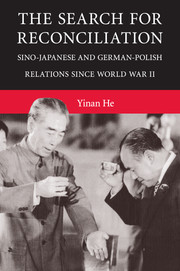Book contents
- Frontmatter
- Contents
- Tables and Illustrations
- Acknowledgments
- List of Abbreviations
- List of Postwar Japanese Prime Ministers and (West) German Chancellors
- Chronology
- Introduction
- 1 Explaining Deep Interstate Reconciliation
- 2 When East Meets West: Postwar German-Polish Reconciliation
- 3 Initial Isolation: Pre-Normalization Sino-Japanese Relations
- 4 The “Honeymoon” Period: Sino-Japanese Relations, 1972–1981
- 5 An Old Feud Comes Back: Sino-Japanese Relations in the 1980s
- 6 Volatility and Downward Spiral: Sino-Japanese Relations from the 1990s to the Present
- Conclusion
- Appendix
- Bibliography
- Index
Introduction
Published online by Cambridge University Press: 04 August 2010
- Frontmatter
- Contents
- Tables and Illustrations
- Acknowledgments
- List of Abbreviations
- List of Postwar Japanese Prime Ministers and (West) German Chancellors
- Chronology
- Introduction
- 1 Explaining Deep Interstate Reconciliation
- 2 When East Meets West: Postwar German-Polish Reconciliation
- 3 Initial Isolation: Pre-Normalization Sino-Japanese Relations
- 4 The “Honeymoon” Period: Sino-Japanese Relations, 1972–1981
- 5 An Old Feud Comes Back: Sino-Japanese Relations in the 1980s
- 6 Volatility and Downward Spiral: Sino-Japanese Relations from the 1990s to the Present
- Conclusion
- Appendix
- Bibliography
- Index
Summary
In the aftermath of traumatic conflicts, why have some former enemy countries managed to establish durable peace whereas others remain mired in animosity? Does historical memory play an important role in shaping postconflict interstate relationships? This book has two main goals: to explore the origins of interstate reconciliation and to generalize causal links between historical ideas and international relations. Both are understudied but extremely important subjects in the field of international relations.
I argue that the key to realizing deep reconciliation is the harmonization of national memories between the parties involved. The memory divergence that comes about as a result of national mythmaking tends to harm the long-term prospects of reconciliation. As H. Richard Niebuhr says in The Meaning of Revelation, “Where common memory is lacking, where [people] do not share in the same past, there can be no real community, and where community is to be formed common memory must be created.…[T]he measure of our unity is the extent of our common memory.”
This line of argument directly challenges the standard realist explanation of international relations. For a hard-nosed realist concerned primarily about power, reconciliation is equated with political and military cooperation that should occur when states have common strategic interests, and the remembering and forgetting of traumatic history are irrelevant to reconciliation. This book, on the other hand, proposes the concept of deep interstate reconciliation, which is posited on the assumption that countries share the understanding that war is unthinkable and hold generally amicable feelings toward each other.
- Type
- Chapter
- Information
- The Search for ReconciliationSino-Japanese and German-Polish Relations since World War II, pp. 1 - 11Publisher: Cambridge University PressPrint publication year: 2009

